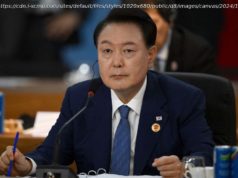She just gave her first interview since being released from military prison.
In her since being given an early release from prison, Army Pvt. Chelsea Manning gave a blunt explanation for why she’ d given hundreds of thousands of US diplomatic cables, battlefield reports, Guantanamo Bay documents, and classified videos: She felt that what her government was doing was profoundly wrong. In an excerpt released by ABC, Manning outlined why she was particularly troubled by the civilians killed in military operations, including two, and by what she considered to be the unnecessary detention, abuse, and torture of prisoners. “I have a responsibility to the public, ” she said in the interview with reporter JuJu Chang, the first she has given since being from prison nearly 30 years early. “We all have responsibility.” Manning acted on her unease in 2010 by taking matters into her own hands and releasing more than 700,000 classified documents, one of the biggest unauthorized dumps of confidential US government information in the country’s history. The move put WikiLeaks on the map and made its founder, Julian Assange, a global celebrity. Among the biggest disclosures: In May 2010, Manning was arrested in Iraq for giving the documents to WikiLeaks and was held in solitary confinement. Her military court martial began in June 2013. That July, she was convicted by a military judge on, including violations of the Espionage Act. A month later, she was sentenced to 35 years in prison. Once she was sent to the Fort Leavenworth military prison in Kansas, Manning immediately asked for hormone therapy so she could feel like her true self. (When she leaked the files to WikiLeaks, she was known as Bradley.) She was originally denied the therapy and twice tried to commit suicide, and went on a hunger strike. In February 2015, after about five years of imprisonment, the military her treatment. Now that she is released, and speaking prominently in public, Manning will continue to garner her fair share of fans and detractors. The fans remain because of what she embodies for the and movements. The detractors speak out because some see her as a to her nation who may have jeopardized US national security. No matter what the contents of the full ABC interview, then, it is unlikely to change her status as one of the most simultaneously revered and despised figures in the recent history of American foreign policy. Manning explained to Chang why she — and she alone — felt she had to pass along military information to WikiLeaks: Manning does hit on something interesting here: that war is hell. Bad things are going to happen, and sometimes even members of the best military in the world do regrettable things. In her mind, rightly or wrongly, those regrettable things need to get out in the open and not kept a secret by the US government. But some believe the actions she took might hurt the way America tries to protect itself and its servicemen and servicewomen and achieve national security goals abroad. Chang pressed Manning on this: There is little evidence that her actions directly caused the deaths of American troops. During Manning’s sentencing hearing, Brig. Gen. Robert Carr, the leader of the military task force charged with studying the impact of her leak, said he could not find any specific examples of anyone who died because of the document dump. « I don’t have a specific example, » he said to a court in Fort Meade, Maryland, according to the. It seems from Manning’s comments that her true motivation was not to punish the United States or its military, but rather to get the information out into the public domain. That said, her leak to the public certainly ran the risk of damaging US security. After all, by letting others see footage of how America fights and negotiates with others countries, enemies could gain knowledge about the way the US conducts war and diplomacy. Usually, those mechanics are kept private so other nations or terrorists don’ t get a preview of military tactics, access to intelligence, and insight into diplomatic discussions behind the scenes. And while US national security issues are interesting, and the crux of why she remains a historic figure in its annals, many wanted to hear about her Bradley-to-Chelsea transition. Manning explained to Chang that it was a life-or-death situation for her: This is partially why she has become such a in the trans community — she was willing to die for her transition and identity in spite of very tough odds. Manning is now free because of then-President Barack Obama’s January decision to commuted her sentence by about 30 years, but she is still in the middle of a legal battle appealing her sentence. With the help for the American Civil Liberties Union, an organization that takes up civil liberties cases, Manning is appealing her conviction. “ [H] er prosecution under the Espionage Act of 1917, which does not allow defendants to argue that their disclosures were in the public interest, violated the Constitution and should be overturned, ” the ACLU on Manning’s behalf. In the meantime, she remains part of the US Army and will receive military health care and other benefits while she waits for a decision on her appeal, though she won’ t receive a paycheck. She will also not be required to perform duties as a soldier. The debate over Chelsea Manning won’ t end anytime soon. The new interview with ABC, in fact, may end up jumpstarting it all over again.






